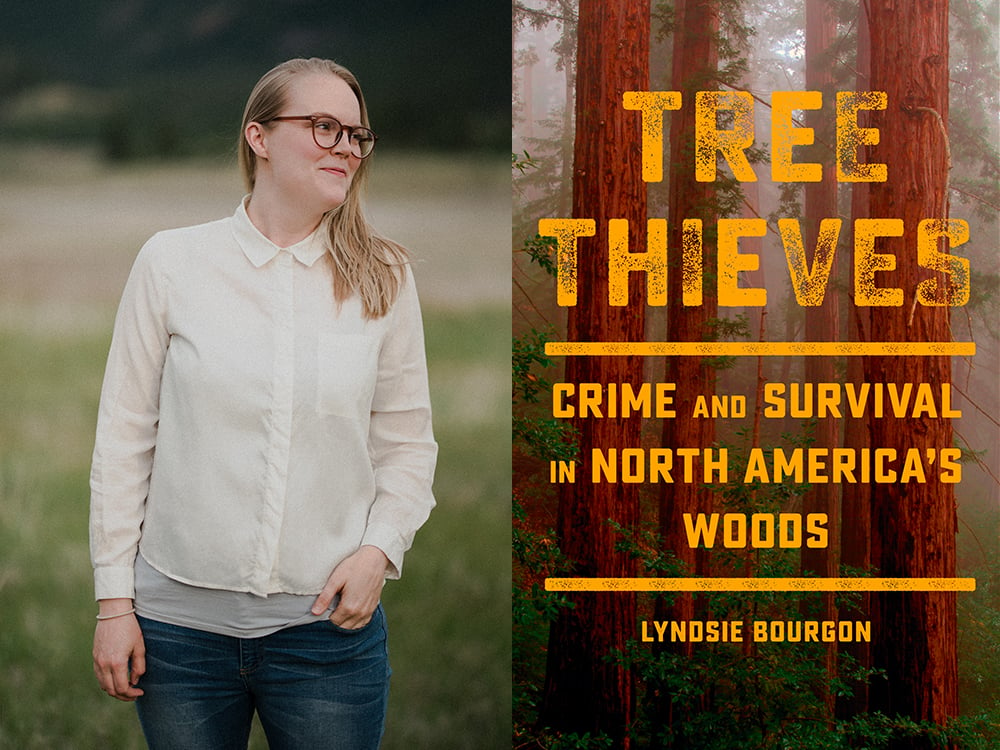Lyndsie Bourgon’s Tree Thieves opens in Northern California. It’s night, and we’re driving down the Redwood Highway in a pickup truck that pulls onto a logging road. Two men make their way into a forest with a chainsaw. And then they cut sections from a centuries-old redwood, flip-flopping them back down the hill to their truck.
In the excerpt we’ll publish tomorrow, from later in the book, Bourgon spends time with a B.C. government natural resource officer in Nanaimo, B.C., who is trying to make sense of timber poaching in his neck of the woods.
Tree Thieves braids these twin narratives together — the stories of poachers and those tracking them down — to investigate why timber theft is an issue, and why, particularly in B.C., it’s a problem that’s only getting worse.
The Tyee regularly publishes stories about B.C.’s forest industry and the people working to preserve B.C.’s forests and old growth.
But we write less often about those left behind when the industry leaves a mill or logging town that’s replaced by a park or reserve. The people who, sometimes, become tree poachers.
Bourgon’s book takes a deeper look at the socioeconomic factors that lead someone to cut sections from an 800-year-old cedar tree. So we caught up with her to chat about it.
This interview has been edited for length and clarity.
The Tyee: Why is tree poaching an issue people should be concerned about? How does it affect our forests?
Lyndsie Bourgon: Poaching is not necessarily new. It's been happening for generations, and there's a lot of it that is kind of a folk tradition, in a sense. It tends to kind of ebb and flow with the tide. And that tide can be affected by things like lumber pricing and access to mills and the socioeconomic status of towns. But Vancouver Island, and B.C. in general, have really seen an increase in tree poaching over the past five years, and even a little bit longer than that. The numbers really show an increase since 2013.
Even though it can look like it's small scale compared to the clear-cut logging and corporate logging that happens in the province, poaching fells trees that have been put aside or designated protected. And there's so little old growth left, as everyone in the province knows, that when timber poaching takes place, it is removing single stems of old growth from the forest. And that has an ecological impact.
But I also argue that there are reasons to be interested in this that are more cultural — and that it’s necessary to get a broader sense of what's going on in our region and how people might be experiencing all these disparate environmental and economic factors that come into play when people poach trees in forested regions.
Could you expand on the idea of poaching as a folk tradition?
In 13th century European history, there are records that show that commoners would be poaching from recently enclosed parkland that used to be part of the commons, and poaching from land that was owned by aristocrats, and monarchy. It was often done in small groups of people leaving from their community and going on to land that was once common land and taking trees out all together as one, for use for firewood or building material, fences, that kind of thing. And that's really continued throughout history. It looks a little bit different in the United States, but even now, when I was interviewing poachers for the book, a lot of them would say, ‘Well, this is something that's been going on forever. My dad did it. My grandpa did it.’ So in that sense, it is this kind of community activity.
Logging has historically been an important industry, economically, in B.C., and it’s also intertwined with the province’s colonial history, and our history of resource exploitation. How does poaching fit into the broader picture of logging?
The Ministry of Forests, Lands, Natural Resource Operations and Rural Development handles illegal logging. So they are all under the same umbrella. This is a crime that is charged under the Forest and Range Practices Act. The small-scale poaching, which I write a fair bit about, because I think it's very compelling, it's not going to be considered or even investigated by folks that are investigating, say, a corporate company going outside Crown land boundaries. But it is all related, I think, to a history of very spotty land management decisions. Over-logging and clear cutting in the past was happening on completely unsustainable levels. And then it was halted through the hard work of many people, and much of this land was conserved, but because it was happening in such huge chunks and it wasn't managed sustainably at all, entire communities one day had logging jobs, and then didn't, as opposed to maybe the industry evening out a little bit more. And so I think it contributes, in a sort of trickle down, that way.
One of the things you do in this book is take a look at why people poach trees. Intertwined with the narratives of resource officers trying to track down and prosecute poaching offences, you’ve included, for example, the narrative of Danny Garcia, a former poacher turned good. Could you talk a bit about what you learned from Garcia?
Danny is from a Northern Californian family. He grew up working class. His dad was a long haul trucker, and spent a lot of time on the road. When Danny graduated, he moved to Orick to be closer to his family, because his family had really deep roots in Northern California, particularly in the small town of Orick, where a lot of burl poaching comes around. And he really laid out for me how his family — I also interviewed his Uncle Terry who has poached wood — really sees it as a response to conservation, particularly the installation and the expansion of the Redwood National Park. He explained how he felt that the park was very unfair to the community, and that the community had really been thrust into poverty after the park came in and logging was no longer happening in the area. He said they held the park responsible for that. And he also had a very deep background in logging. I asked him numerous times how he learned how to use a chainsaw and he didn’t remember, it was just always around him. And so it was really access to trees and the ability to remove burls from them and sell them that really made poaching a fairly easy thing for him.
Is poverty and lack of economic opportunity basically why we’ve been seeing an uptick in poaching in British Columbia over the past five years?
That paired with a lumber industry that has just been kind of yo-yoing, but at points has reached heights that hadn't been seen in decades since before the War in the Woods, when wood was incredibly valuable.
There are a lot of communities in the Pacific Northwest and particularly in B.C. and on Vancouver Island that have really struggled to get through deindustrialization and keep up an economy that can keep the town running. There has been quite a bit of sociological research done into this that shows that many of the small towns that were near forests, near Crown lands, near national forests in particular that were reliant on those industries have been — I don't always like to say “disenfranchised,” because I don't think it's the right word, but they've struggled to keep the communities viable, and to prevent the communities from falling into disrepair, and to keep the people that live there from experiencing economic disenfranchisement and mass unemployment.
So that paired with an incentive that if you can poach some wood and sell it for good money, and you know where to take it, you know someone who will buy it, or you can move it quickly, for a little bit less than market value, has created this situation where you've seen community forest managers and natural resource officers on the islands saying, basically, this is just constant, there are hundreds of poachings every year. They're coming across them all the time, very obviously along the side of the road.
What did the natural resource officers you spoke to suggest in terms of solutions to this problem? What did poachers and former poachers suggest?
I think the natural resource officers would certainly say that an increased budget to increase their capacity and have more people around would be helpful. I talk about in the book a case of an 800-year-old-cedar that was poached. That park had had so many cuts, but there were people going in only a couple times a year to monitor that land. It seems pretty egregious to leave it most of the time. It's not like there was a fence around it, even, to keep people out. So people were just able to drive right into the parking lot, cut down a tree and take it out. So I think, you know, funding, certainly, on their end.
Poaching experts who work on a more global context would say that no matter how much we put into technological solutions and dealing with the symptom rather than the root cause, that poaching will always adapt, and that the root cause is inequality and socioeconomic challenges. So, until we start looking at why people are motivated, people will just continue to learn what's being done and try to skirt it.
Is there a question you've anticipated that interviewers will ask and prepared for that no one's asked yet?
There are huge issues with forestry in B.C., and it can seem like poaching, you know, even if it's hundreds of trees in a year, is not, like — Teal-Jones can do that in half a day. But I think that poaching is a real microcosm of some of these larger issues. And I think that when you want to look at what motivates people to have very polarized opinions and feel very against conservation, listening to poachers might be one way to understand that, so that we can take lessons and apply them to future conservation initiatives that might lead to having more people on board. That’s something I've really been thinking a lot about, is taking the time to listen to those experiences. And think about how they can apply now. ![]()
Read more: Local Economy, Environment
















Tyee Commenting Guidelines
Comments that violate guidelines risk being deleted, and violations may result in a temporary or permanent user ban. Maintain the spirit of good conversation to stay in the discussion.
*Please note The Tyee is not a forum for spreading misinformation about COVID-19, denying its existence or minimizing its risk to public health.
Do:
Do not: